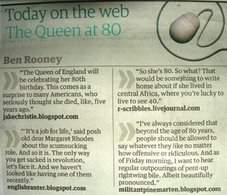It may have escaped the attention of many people outside France that Jacques Chirac has been taken ill. Indeed, the idea was that the French weren’t supposed to notice either. Not just the Great Unwashed either, but absolutely everyone up to the highest levels of the State was kept in the dark from the evening of Friday 2nd September, when Chirac was taken to hospital, to 10am the next day. During that time, no one at the Elysée thought it necessary to tell the prime minister Dominique de Villepin, the Cabinet or the President of the Senate Christian Poncelet, who would take over from Chirac if he was incapable of governing through illness or death.
First of all, what exactly happened? According to Le Monde (Monday’s edition you’ll notice), after entertaining an Andorran delegation, at about 6.30pm, Our Jacques retired to his office for a little late-night cramming. Once there, he experienced a strong migraine and troubles with vision in one eye, whereupon he called his doctor, who decided that this required some check-ups at the Val-de-Grâce military hospital. So the President’s motorcade (without the usual motorcycle outriders to avoid attracting attention) left the Elysée Palace at about 8pm. There, doctors decide to keep him in for further tests and observations overnight, but Chirac decides to tell no one apart from his wife, his daughter and his private secretary. He’ll call the prime minister on Saturday after he receives the test results.
Dominique de Villepin was told of Chirac’s hospitalisation at about 9.30 the next day, which is when the Interior Minister, Nicolas Sarkozy, claimed on Sunday evening on TF1 to have been told. But this is where the first evidence of jostling for position in the wake of the President’s possible quitting of the scene appears. You see, in France as in the UK, it’s the party conference season, and as head of the UMP party, Sarko was at the conference in La Baule. It looked for all the world on the televised coverage of the conference that Sarko was told about Chirac’s condition at 1pm by de Villepin himself, which suggests that the President didn’t bother to tell him, a deliberate display of spurning.
The shenanigans and political manoeuvring in the immediate aftermath of the President’s illness remind me of a similar sequence of events in Cuba in 2001, when Castro collapsed during a speech and his entourage’s body language seemed to be a rehearsal for the immediate post-Castro distribution of power. Castro’s planned successor is his brother Raoul. The question in France is whether de Villepin is Chirac’s dauphin.
Under the Ancien Régime, the king’s death would be greeted with a cry of “Le Roi est mort! Vive le Roi!” to indicate that there was no vacancy in power, that there was continuity in the organs of State. The problem with what’s just happened with Chirac is that no one made any such assurance. Indeed, communication on exactly what the President’s state of health is remains vague. Currently, all that the Elysée has said is that he had a “minor vascular accident”, although it’s pretty clear that what we’re talking about is a small blood clot in the brain. Traditionally, for some unfathomable reason, the French President’s health has been a state secret. Mitterrand kept his prostate cancer a secret from 1981 onwards, publishing monthly completely fabricated health bulletins. Potentially, this can lead to the State having no effective head without anyone knowing, to a power vacuum, and this is an anomaly that must be rectified in future.
Admittedly, Chirac’s not dead, and isn’t planning on departing this Earth anytime soon. But this event does almost certainly mean that he won’t stand for reelection in 2007, denying Sarko his coveted duel with the Old Man. So the big question is whether Sarko or de Villepin will be the Centre-Right’s favoured candidate in 2007, or even whether there could be a Sarko vs. Villepin scrap, since there is nothing to stop either of them throwing their hat in the ring regardless. Sarko may do this in his single-minded drive to become Caliph instead of the Caliph. I don’t think de Villepin would, in order to avoid fragmenting the Centre-Right vote. Either way, this is going to be an election to watch, where for once, there will be no geriatric candidates except for that perennial furuncle on France’s face that is Jean-Marie Le Pen.
First of all, what exactly happened? According to Le Monde (Monday’s edition you’ll notice), after entertaining an Andorran delegation, at about 6.30pm, Our Jacques retired to his office for a little late-night cramming. Once there, he experienced a strong migraine and troubles with vision in one eye, whereupon he called his doctor, who decided that this required some check-ups at the Val-de-Grâce military hospital. So the President’s motorcade (without the usual motorcycle outriders to avoid attracting attention) left the Elysée Palace at about 8pm. There, doctors decide to keep him in for further tests and observations overnight, but Chirac decides to tell no one apart from his wife, his daughter and his private secretary. He’ll call the prime minister on Saturday after he receives the test results.
Dominique de Villepin was told of Chirac’s hospitalisation at about 9.30 the next day, which is when the Interior Minister, Nicolas Sarkozy, claimed on Sunday evening on TF1 to have been told. But this is where the first evidence of jostling for position in the wake of the President’s possible quitting of the scene appears. You see, in France as in the UK, it’s the party conference season, and as head of the UMP party, Sarko was at the conference in La Baule. It looked for all the world on the televised coverage of the conference that Sarko was told about Chirac’s condition at 1pm by de Villepin himself, which suggests that the President didn’t bother to tell him, a deliberate display of spurning.
The shenanigans and political manoeuvring in the immediate aftermath of the President’s illness remind me of a similar sequence of events in Cuba in 2001, when Castro collapsed during a speech and his entourage’s body language seemed to be a rehearsal for the immediate post-Castro distribution of power. Castro’s planned successor is his brother Raoul. The question in France is whether de Villepin is Chirac’s dauphin.
Under the Ancien Régime, the king’s death would be greeted with a cry of “Le Roi est mort! Vive le Roi!” to indicate that there was no vacancy in power, that there was continuity in the organs of State. The problem with what’s just happened with Chirac is that no one made any such assurance. Indeed, communication on exactly what the President’s state of health is remains vague. Currently, all that the Elysée has said is that he had a “minor vascular accident”, although it’s pretty clear that what we’re talking about is a small blood clot in the brain. Traditionally, for some unfathomable reason, the French President’s health has been a state secret. Mitterrand kept his prostate cancer a secret from 1981 onwards, publishing monthly completely fabricated health bulletins. Potentially, this can lead to the State having no effective head without anyone knowing, to a power vacuum, and this is an anomaly that must be rectified in future.
Admittedly, Chirac’s not dead, and isn’t planning on departing this Earth anytime soon. But this event does almost certainly mean that he won’t stand for reelection in 2007, denying Sarko his coveted duel with the Old Man. So the big question is whether Sarko or de Villepin will be the Centre-Right’s favoured candidate in 2007, or even whether there could be a Sarko vs. Villepin scrap, since there is nothing to stop either of them throwing their hat in the ring regardless. Sarko may do this in his single-minded drive to become Caliph instead of the Caliph. I don’t think de Villepin would, in order to avoid fragmenting the Centre-Right vote. Either way, this is going to be an election to watch, where for once, there will be no geriatric candidates except for that perennial furuncle on France’s face that is Jean-Marie Le Pen.






1 comment:
Post a Comment